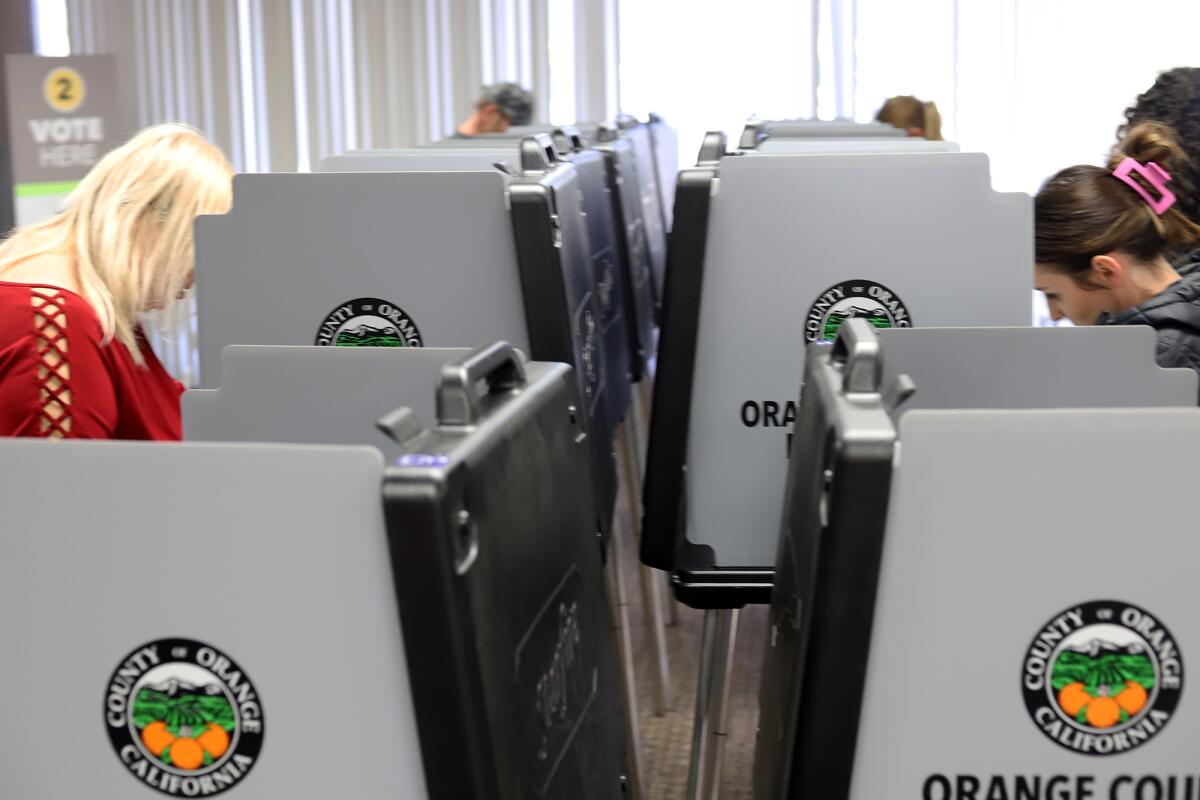Lawsuit alleges Huntington Beachâs at-large elections disenfranchise Latino residents

The city of Huntington Beach was sued in Orange County Superior Court last week over its at-large elections.
The lawsuit alleges the city is disenfranchising its minority residents by holding the at-large elections, rather than district-based elections, for seats on the City Council.
A Latino voter participation organization called the Southwest Voter Registration Education Project, as well as Huntington Beach activist Victor Valladares, are the plaintiffs in the lawsuit.
Theyâre being represented by Malibu-based attorney Kevin Shenkman, who has gotten several cities statewide to switch to district-based elections over the last several years.
Now Shenkman is going after Huntington Beach, after sending warning letters in 2017 as well as earlier this year. The basis for his claims is the California Voting Rights Act, passed in 2001, which makes it easier for minority groups to change at-large elections based on claims of vote dilution.
Huntington Beach voters currently vote for every City Council seat. In a district-based election, voters would select just one candidate who lives in their particular district of the city.
Valladaresâ friend and Oak View ComUNIDAD co-founder, Oscar Rodriguez, unsuccessfully ran for the City Council in 2020 and 2022. Both are from the majority Latino Oak View neighborhood; Rodriguez currently serves on the Planning Commission.
Valladares said that when he was serving on the cityâs Citizen Participation Advisory Board, he noticed that politicians didnât care about his community.
âMost people donât represent the marginalized communities like ours,â he said in an interview Thursday. âOscar is somebody from the neighborhood, who has lived the struggles.â
Valladares noted that one of the first things the current conservative City Council majority did was substantially raise the campaign contribution limits, from $620 to $4,900 per person or business.
âThat makes it a lot harder for a local grassroots leader that truly knows their community or district,â he said. âItâs almost near impossible. If people want to talk about local control, what better example of having local control than having district-based elections? Thatâs how I see it.â

Some Orange County cities have moved to district-based elections. In the March primary election, Irvine voters approved Measure D, a charter amendment that will move that city to district-based city council elections. And on April 16, the San Clemente City Council approved a district map for its own elections.
Huntington Beach City Atty. Michael Gates vowed Thursday to fight the lawsuit. In a letter to Shenkman on March 7, he noted Huntington Beachâs charter gives citizens the right to vote for all City Council positions.
Additionally, he said Latino candidates have been very successful in Huntington Beach. In the cityâs 2020 City Council election, he noted that three of the top five finishers â Tito Ortiz, current mayor Gracey Van Der Mark and Rodriguez â were Latino.
âI think thatâs a pretty good indicator that the at-large system of elections works in Huntington Beach,â Gates said.
Per the 2020 U.S. Census, about 19.8% of the city was non-white Hispanic, slightly more than 39,000 people.
âWhat [Shenkman] is alleging simply isnât true,â Gates said. âHe makes these charges against cities about their elections, but I think he forgets that he actually has to prove dilution and discrimination at trial. Thatâs important, because in Huntington Beach, our at-large election system is incredibly successful. Itâs successful not only for the voters, but also for the candidates who try to run, no matter what race they are.â
But Valladares said that representation wasnât only about race but money, and district-based voting could give more representation to his neighborhood.
âIâve lived here almost my entire life, and Iâve grown up in Oak View,â he said. âI know the neighborhood, I know every part of the city ... Oak View is Huntington Beach, and Huntington Beach is Oak View. But Iâve never seen anybody else from outside of Oak View advocate for Oak View, fight for Oak View, stand up for Oak View.
âThey donât ... itâs âthat brown neighborhood.â Thatâs how it is.â
All the latest on Orange County from Orange County.
Get our free TimesOC newsletter.
You may occasionally receive promotional content from the Daily Pilot.




